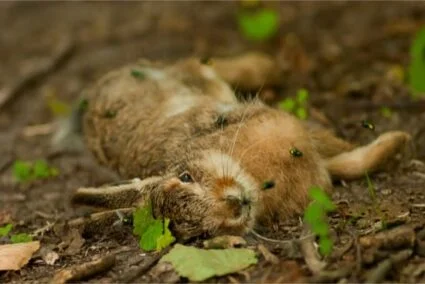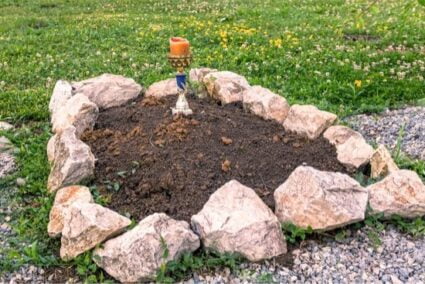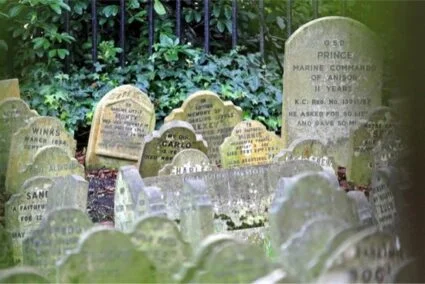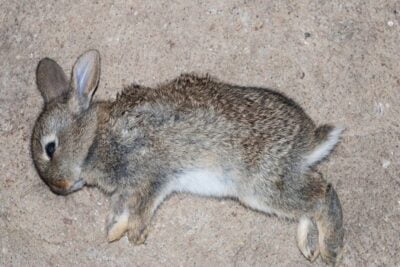The hardest part of pet ownership is when your beloved rabbit dies. At an already difficult time, you need to consider the practicalities of dead pet disposal. When a rabbit passes away, you must remove their remains empathetically but legally. Animal body disposal laws vary from state to state.
You may be permitted to put your rabbit in the garbage, but laws vary between states. If it’s legal, you can bury your rabbit in your yard. If not, look into a cremation and memorial service.
Many things must be considered when your rabbit dies. Safety is paramount, for you and your neighborhood. If a corpse contains traces of infection, it needs to be handled in a particular way. This guide explains all you need to know about how to dispose of a dead rabbit’s body.
How Do I Make Sure That My Rabbit is Dead?
You must ensure that your bunny is actually deceased. Older rabbits, or those living with a disease, can be inactive. It’s easy to fear the worst, only to find they’re still alive. Check your rabbit’s vital signs if they appear to be deceased. This means:
- Breathing. Hold a finger slightly in front of their nose and mouth to confirm.
- Pulse. This is found on the inner thigh, above the femoral artery.
- Signs of urgent defecation. Rabbits empty their bowels at the moment of death.
- Capillary refill. This should be every two seconds.
If you are confident that your rabbit has passed on, start making arrangements. Always be sure, though. It’s not unheard of for rabbits to ‘rise from the dead,’ especially in freezing temperatures.
What to Do with a Dead Rabbit?
When you have confirmed that your rabbit has died, you must dispose of the rabbit’s corpse.
If your rabbit passed away under the care of a vet, they would offer to take care of their remains. It is advisable to accept this offer, especially if your rabbit was euthanized.
A vet will arrange for burial or cremation in a safe, dignified and legally-compliant manner. There will be a cost implication. It will be cheaper than a fine from a local authority for inappropriate animal disposal, though. If your bunny passed away at home, you have the following options:
- Garbage Disposal. Check with your local refuse collector for state-specific rules.
- Composting. If you don’t wish to keep the remains, but prefer not to trash them, consider composting.
- Private Burial. Many people prefer to bury their pets at home. Again, there will be legal implications surrounding this that need to be verified.
- Private Cremation. You can arrange a private cremation from a local provider. This will be costly, but safe and dignified.
It’s best to call animal control when you find your rabbit’s body. They will be able to advise on the appropriate action.

Can You Put a Dead Rabbit in the Bin?
Putting the body of your bunny into the garbage doesn’t seem like a very dignified end. You have to focus on the times that you shared, though. Your pet is gone. What remains is just their body.
Some cities and states allow you to dispose of small or medium-sized animals in the garbage. Call your local sanitation department and check if this applies to you.
There may be specific regulations that apply, even if you can put a dead animal in the trash. Things to consider include:
- Do wild animals root through your garbage? Ensure that the rabbit’s body is securely wrapped.
- How long is it until your garbage is collected? Animal corpses smell pretty bad. Consider leaving the body in the freezer until collection day.
- Do you need to label the body as animal remains? Do so, if necessary. The last thing you want is a refuse collector refusing to take the corpse.
- Is there any risk of the remains carrying an infectious disease? This means that leaving them in a public place is not an option.
Tossing a dead rabbit into the garbage isn’t an ideal solution. It remains open to you, though, if you seemingly have no other options.
All the same, don’t assume that you can throw away a rabbit with used coffee beans. Specific protocols must be observed, for the safety of your neighbors.
Can a Dead Rabbit to Used for Composting?
As the Permaculture Research Institute explains, a dead rabbit can be composted. This could be a solution for some pet owners. It’s a compromise if you cannot keep the remains, but don’t want to throw them away.
Your rabbit’s body is added to a compost pile, where it decomposes naturally. This is an environmentally friendly way to say goodbye for your pet. Your bunny will live on in the fields and air of your state.
The only issue with composting is the location. Unless you already have a very large compost pile on your property, home is not ideal. All the same, if your bunny was killed by disease, transport in inadvisable.
If you live close to a farm, consider asking if they would like to compost your rabbit’s remains. A farm will often be happy to do so, as they already have a similar pile at work.
Can I Bury My Rabbit in My Yard?
If your rabbit was a beloved family member, you might want to bury them in your yard. This way, you can create a memorial. You’ll always have something to remember your pet.
If this is something you’d like to do, check if it’s legal in your state. You can learn this information from your local Board of Health. If in doubt, contact animal control and ask for their advice.
Most states will permit the burial of a small animal, such as a rabbit. Always be sure, though. Losing your pet is tough; digging them up again on legal instruction is even tougher.
If you rent your property, you will also need permission from the landowner. Burying animal remains may be considered a breach of your tenancy. This can result in eviction.

These laws do not exist to make life difficult for bereaved pet owners. Instead, they are based on health and safety regulations. Dead animals can create a health hazard for humans and wildlife.
If you have the go-ahead to bury your pet, you’ll need to ensure that you do so appropriately. Never fudge a pet burial in your grief. This can lead to further complications.
Is it Legal to Bury a Rabbit on Public Grounds?
If your rabbit loved to play outside, you might wish to consider burying them in great outdoors. This must be handled carefully, though.
As Memorials explains, most authorities will reject any request to bury an animal on public grounds. The concerns are the same as though linked to home burial.
- A deceased animal, especially one that died through sickness, could make wildlife unwell.
- The decomposing remains of a dead animal could seep into a local water supply. This endangers the health of humans and wildlife.
- Somebody digging on public grounds without appropriate knowledge could damage power or telecommunications lines.
- Avoid the temptation to bury your bunny in the local park. You’ll get in trouble, and their gravesite may be disturbed.
If you’d like a memorial for your rabbit after they pass, stick with your home. Alternatively, investigate cremation and a memorial at a pet cemetery.
Pet Rabbit Cremation
If you are unable to bury your rabbit, cremation is an alternative way to create a memorial. While more commonly associated with larger pets, cremation is open to rabbits too.
The process will involve taking your rabbit’s body to an animal crematorium. Once there, you can discuss your options. You may wish to purchase an urn to hold their ashes, or arrange an online memorial.
The latter will be cheaper, but the former allows you a physical memory of your bunny.
The price of cremation varies, depending on the service you choose. The cheapest option will be a communal creation. This sees several animals cremated together, and the expense shared among their human families.
Once you have the ashes, you can do with them as you please. You may wish to keep them in an urn. You could scatter them over your yard. You could even turn them into jewelry.
Finally, consider placing your rabbit’s remains in a pet cemetery. Many animal crematoriums will house such a location. With a memorial, you can always visit your rabbit.
Handling a Dead Rabbit
When you discover that your rabbit has passed away, you’ll want to take action quickly. None of us want to compromise our pet’s dignity, even after the pass away.
You must be careful when handling any dead animal. Don’t just pick them up and hold them. Take the appropriate care to ensure your safety by first answering these questions.
- How did the rabbit die? If they were sick, acknowledge this and take care. A bunny passing away through old age is less concerning.
- How long has the rabbit been dead? Have you returned from vacation to a dead bunny? It may have been this way for days.
- Does the rabbit smell bad? It takes around three days for the decomposition process to begin. If a rabbit smells, this is a vital sign.
If your rabbit has been dead for several days, and started to decompose, you should not touch it. Call animal services or a dead pet disposal service.
If the passing was sudden, you can handle the rabbit with appropriate care. Always wear gloves. It’s also advisable to wear clothing that you will not mind tossing away.
Gently wrap your rabbit in a bag, box or crate, and arrange the disposal of their remains. As discussed, you have several options for this.
How to Bury a Rabbit
If you have the legal clearance to bury your bunny, you can go ahead. You’ll need to make sure you do so properly, though. The steps of burying a rabbit on your property are as follows:
- Consider a coffin. If your rabbit died of natural causes, this is not necessary. If they were sick or euthanized, they must be covered. A box or plastic crate will be suitable.
- Choose an appropriate location for the burial. This should be at least 50 feet from your home and any body of water. This prevents your rabbit’s decomposing remains from contaminating the water supply.
- Ensure that your digging will not interfere with any utility lines. You may need to consult your local authority for this.
- Dig a grave for your rabbit. You may get away with two feet for this, but three or four feet is advisable. If the hole is not deep enough, dogs, cats or wild predators could dig it up.
- Apply some rocks and stones to the gravesite. These block other animals’ access to the grave, preventing them from digging. They can also double as a memorial headstone.
Once you have completed this process, your work is done. Your rabbit is at rest, and has been buried with dignity. All that’s left is to grieve, and remember the fun times you had together.
Can I Hold a Funeral for My Rabbit?
The pet funeral business is growing in popularity throughout the country. This makes this an option for your bunny.
If you are interested in arranging a formal pet funeral, find a director in your area. The Yellow Pages will list these. Alternatively, ask your vet for advice. They will know of appropriate services.
The funeral can typically be held in your own home, or a pet cemetery. Naturally, this means that you could tie it in with a cremation.

An animal funeral can be costly. This means that, if you’re permitted to bury your bunny, you could always hold your own. This will help with the grieving process, especially for children.
There is no right or wrong way to mark the passing of a rabbit. You need to find an approach that works for your family. If that includes a funeral, so be it.
I Have Two Rabbits and One of Them Has Died
The death of a rabbit with a bonded playmate can be tough. You’ll want to avoid any fatal illness impacting the other bunny. This makes it tempting to separate the rabbits before the end comes.
A bonded bunny would rather see the body of their fallen friend, though. This will not traumatize them. They may even binky around the corpse.
This does not mean that your rabbit is happy their friend has passed. They’ll be devastated, in the longer term. They are just saying goodbye.
You shouldn’t leave a dead rabbit with a living friend long-term. Do let the other bunny see the remains for an hour, though. Comfort your bunny during this period.
The rabbit will be more anxious if their friend ups and disappears, with no possible explanation. Bunnies understand death. They’re surrounded by it in the wild. The chance to say goodbye provides them with closure.
I Found a Dead Rabbit on My Property
Sad as it may be, wild rabbits have a life expectancy of just one year. This means that, if you live in a rural area, dead rabbits will be a common sight.
Bunnies lack road sense, so vehicles often hit them. Wild predators will also frequently hunt and kill rabbits. Once they’ve eaten their fill, they’ll abandon the corpse. If the predator hunts for sport, they won’t even take a bite.
If you find a dead rabbit on your property, don’t handle it directly. You cannot be certain of the cause of death, or how long ago it happened. Call animal control. National Wildlife Removal has a list of helpful contacts for every territory.
If you must move the dead rabbit, use a shovel. Scoop it up, and place it in a thick refuse sack or cardboard box. If it will take longer than a few hours for an animal removal service to arrive, this is advisable.
A dead animal could attract scavengers, or other predators. Also, your own pets may take an interest. If a dog or cat pokes the corpse – or worse, eats it – they may become sick.
If you cannot utilize the services of an animal remove service, you can bury or compost the rabbit yourself. You’ll have to be careful, though.
Use thick gloves, and clothing that you can destroy afterward. Check that your actions are legal in your state, too. Never jeopardize your livelihood for a wild animal.
Knowing how to handle the body of a dead rabbit is sad but necessary. A happy, healthy bunny can live as long as 12 years. That’s more than enough time to get attached to them. You’ll want to give your pet a respectful send-off.
Unfortunately, rabbits are delicate. They can die suddenly, and without warning. You should always be prepared for a potential corpse disposal. Knowing your options will save a lot of heartache at a difficult time.
If your rabbit is less active, or a surgical procedure awaits, know your options. Forewarned is forearmed. You’ll be in a better position to cope with your loss.
Disposing of a rabbit’s corpse is a short, but essential, process. Once it’s done, you can focus on the happy memories that your bunny provided.

